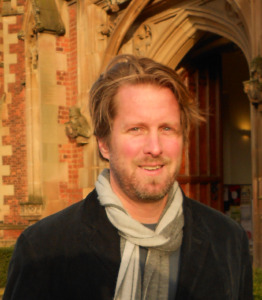Rooting for Odysseus
by Jeffrey Thomson
 If it is true that there are only two stories in the world—someone goes on a journey, or someone tries to get home—The Odyssey is clearly in the second category. There are multiple homecomings in the text as there is more than one way to get home. That Odysseus is lost and trying to get back to Ithaca is a given. Telemachus, his son, is also lost as the story begins. And so is Penelope in her own way. These are three characters who are all trying to get home in their own way, navigating worlds where the rules of hospitality and safety have been rewritten by various antagonists.
If it is true that there are only two stories in the world—someone goes on a journey, or someone tries to get home—The Odyssey is clearly in the second category. There are multiple homecomings in the text as there is more than one way to get home. That Odysseus is lost and trying to get back to Ithaca is a given. Telemachus, his son, is also lost as the story begins. And so is Penelope in her own way. These are three characters who are all trying to get home in their own way, navigating worlds where the rules of hospitality and safety have been rewritten by various antagonists.
Odysseus is also a warrior and a veteran of a savage ten-year campaign that reduced a great city to rubble. He even weeps when he hears a piece of his story told back to him. Like many who have gone to war, his transition back to his life-as-it-was is far more complicated than he imagined it would be. It is not easy to leave behind that space of violence and savagery.
Like its partner story, The Iliad, The Odyssey is a foundational text from the infancy of our storytelling culture. On close examination, its characters are problematic and damaged human beings while the gods they worship and who aid or oppose them can be read as moral monsters. The qualities that make Odysseus a hero are often not qualities that we would encourage or engage in, but nonetheless we find ourselves rooting for him to finally come home and set his house in order. He is, as Emily Wilson calls him, “a complicated man.”
Read The Odyssey with Jeffrey
FIVE TUESDAYS, APRIL 2, 9, 16, 23, & 30: “Reading The Odyssey: Coming Home from War,” 6:00-8:00 p.m., virtual via Zoom. Info and registration
In this five-week course, participants will explore The Odyssey (Emily Wilson’s translation) as a story of a man trying to come home physically from Troy but emotionally and spiritually as well. His is a magical, fantastical journey that may be almost entirely fiction, but it is also a journey for his wife and son as they navigate his absence and return. During the first week, we’ll cover the intro and background around Homer, the Trojan Cycle and the Nostos stories. The following weeks we’ll read 6 books ahead, and then discuss the rich discoveries of the text as a group.
Note: This is a “Zoom Plus One” event. You can add a guest for free!
About Jeffrey
Jeffrey Thomson is a poet, memoirist, translator, and editor, and the author of ten books including Museum of Objects Burned by the Souls in Purgatory and Half/Life: New and Selected Poems from Alice James Books, The Belfast Notebooks, The Complete Poems of Catullus, and From the Fishouse. He has been an NEA Fellow, the Fulbright Distinguished Scholar in Creative Writing at the Seamus Heaney Poetry Centre at Queen’s University Belfast, and the Hodson Trust-John Carter Brown Fellow at Brown University. He is currently professor of creative writing at the University of Maine Farmington.
